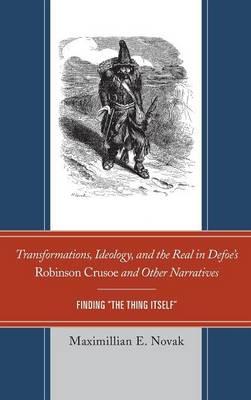Full Product Details
Author: Maximillian E. Novak
Publisher: Bloomsbury Publishing Plc
Imprint: University of Delaware Press
Dimensions:
Width: 16.30cm
, Height: 2.30cm
, Length: 23.80cm
Weight: 0.485kg
ISBN: 9781611494853
ISBN 10: 1611494850
Pages: 250
Publication Date: 24 October 2014
Audience:
College/higher education
,
Undergraduate
,
Postgraduate, Research & Scholarly
Format: Hardback
Publisher's Status: Active
Availability: In Print

This item will be ordered in for you from one of our suppliers. Upon receipt, we will promptly dispatch it out to you. For in store availability, please contact us.
Reviews
Written over the span of 20 years, all but one of them previously published, these 11 essays consider the tripartite thematic suggested in the title. 'Transformations' refers to questions of genre and how Defoe advanced toward a new form of fiction, principally in Robinson Crusoe, but also in other work. 'Ideology' is represented in Defoe’s own work and in the work of writers he inspired--Hannah Hewit, Maria Edgeworth, Frances Burney. 'Real' shows up in such chapters as the second, which frames Defoe’s realism within a perspective drawn from Dutch paintings. . . .The book offers a winsome look at Novak’s early years of studying Defoe, and it concludes with ruminations on Defoe’s present and future importance. In the end, this is a significant contribution to Defoe studies because it includes fine essays (among them the brilliant 'Meatless Fridays: Cannibalism as Theme and Metaphor in Robinson Crusoe') bristling with scholarly expertise and alert familiarity with critical theory, written in a clear and winning style. This volume cumulates the wisdom of a distinguished scholar who has lived in intimacy with his subject for some six decades. Summing Up: Highly recommended. Graduate students, researchers, faculty. * CHOICE * Novak has established Defoe as a major intellectual, and his many writings convincingly show that Defoe grappled with the key problems of his day, both practical and theoretical. * Eighteenth-Century Fiction *
Written over the span of 20 years, all but one of them previously published, these 11 essays consider the tripartite thematic suggested in the title. 'Transformations' refers to questions of genre and how Defoe advanced toward a new form of fiction, principally in Robinson Crusoe, but also in other work. 'Ideology' is represented in Defoe's own work and in the work of writers he inspired--Hannah Hewit, Maria Edgeworth, Frances Burney. 'Real' shows up in such chapters as the second, which frames Defoe's realism within a perspective drawn from Dutch paintings...The book offers a winsome look at Novak's early years of studying Defoe, and it concludes with ruminations on Defoe's present and future importance. In the end, this is a significant contribution to Defoe studies because it includes fine essays (among them the brilliant 'Meatless Fridays: Cannibalism as Theme and Metaphor in Robinson Crusoe') bristling with scholarly expertise and alert familiarity with critical theory, written in a clear and winning style. This volume cumulates the wisdom of a distinguished scholar who has lived in intimacy with his subject for some six decades. Summing Up: Highly recommended. Graduate students, researchers, faculty. CHOICE
Written over the span of 20 years, all but one of them previously published, these 11 essays consider the tripartite thematic suggested in the title. 'Transformations' refers to questions of genre and how Defoe advanced toward a new form of fiction, principally in Robinson Crusoe, but also in other work. 'Ideology' is represented in Defoe's own work and in the work of writers he inspired--Hannah Hewit, Maria Edgeworth, Frances Burney. 'Real' shows up in such chapters as the second, which frames Defoe's realism within a perspective drawn from Dutch paintings...The book offers a winsome look at Novak's early years of studying Defoe, and it concludes with ruminations on Defoe's present and future importance. In the end, this is a significant contribution to Defoe studies because it includes fine essays (among them the brilliant 'Meatless Fridays: Cannibalism as Theme and Metaphor in Robinson Crusoe') bristling with scholarly expertise and alert familiarity with critical theory, written in a clear and winning style. This volume cumulates the wisdom of a distinguished scholar who has lived in intimacy with his subject for some six decades. Summing Up: Highly recommended. Graduate students, researchers, faculty. CHOICE Novak has established Defoe as a major intellectual, and his many writings convincingly show that Defoe grappled with the key problems of his day, both practical and theoretical. Eighteenth-Century Fiction
Author Information
Maximillian E. Novak is distinguished research professor of English, emeritus, at the University of California, Los Angeles.




